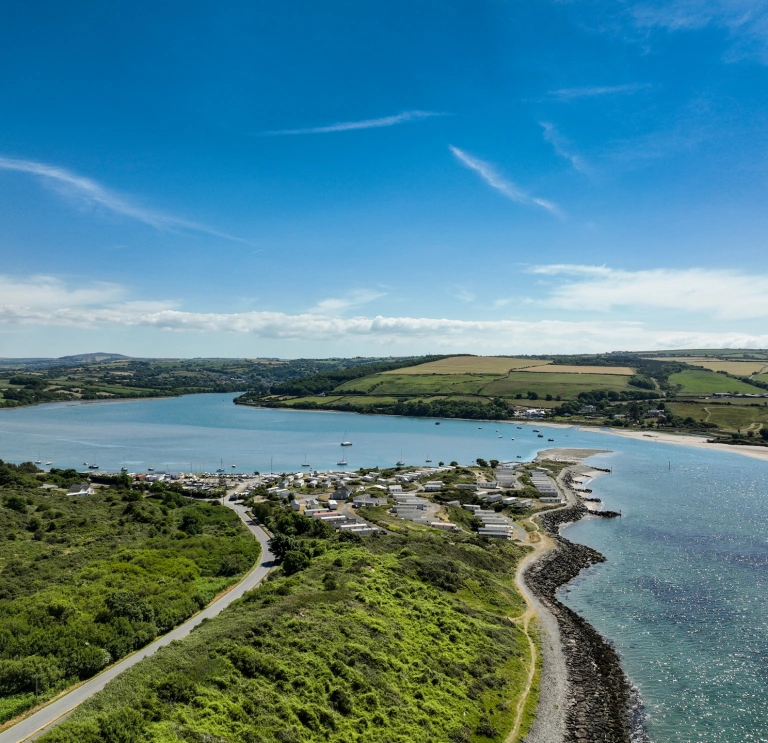Castell Cilgerran
The twin towers of Castell Cilgerran are a clue to the strategic importance of the River Teifi. Control the river, and you control its rich fishing and cargo-carrying capacity. It was squabbled over by Welsh and English forces for two centuries before being abandoned in the mid-14th century. The ruins are still impressive, and it’s in a lovely clifftop spot overlooking the river, three miles upstream from its twin Cardigan Castle, which we’ll visit later.


The Teifi Gorge
There are several ways to walk downstream from Cilgerran through the spectacular Teifi Gorge. The further away from the river, the easier (and safer) the paths. The lowest path – along the river itself – is narrow, slippery and tricky, so don’t try it unless you’re sure-footed. Mind you, this is the path that’s been used by coraclemen for centuries – and they still walk it at night, in pitch-darkness, carrying their boats on their backs. The best way to appreciate the Gorge’s gorgeousness is on the river itself – Adventure Beyond offer guided canoeing trips.


Welsh Wildlife Centre
Teifi Marshes Nature Reserve is home to the Welsh Wildlife Centre, who’ve created miles of waymarked trails, with hides, through wide tracts of wetland. You can hire binoculars and kids’ info backpacks from the café/visitor centre, to help spot the otters, kingfishers, hen harriers, peregrines and curlews that live here. There’s a herd of water buffalos, too – not strictly a native species, but they do a great job of maintaining the marshes for the wildlife.


Cardigan Castle
Carry on walking downstream and you’ll soon reach Cardigan Castle, which guards the lowest bridge across the Teifi. Rhys ap Gruffudd – The Lord Rhys - built the first stone castle here and, to celebrate its completion in 1176, held a gathering of musicians and poets. This was the first National Eisteddfod, a tradition that’s alive and well today. The castle and the Georgian house within its grounds fell into terrible disrepair until a £12m restoration project secured its future as a heritage attraction, restaurant, accommodation and events venue.

Cardigan town
Since you’re here, it’s well worth spending a couple of hours exploring Cardigan (Aberteifi in Welsh). It’s very much a ‘proper’ Welsh town, the hub of local farming and fishing communities, with a strong showing of home-grown businesses. Bara Menyn Bakehouse and café is a good example: with an excellent café, serving local produce. There’s a can-do spirit in the Cardigan air: the town also makes the Hiut jeans worn by Meghan Markle. It's also been ranked third in Time Out's top 10 places to visit in 2023.



North to Mwnt
You’ve got a choice here: on which bank do you follow the Teifi estuary to the sea? The north-side trail heads through Gwbert, then diverts inland slightly before rejoining the coast beyond Cardigan Island. From here it’s a lovely walk up to Mwnt, a perfect sheltered cove that’s one of the best places in Britain for dolphin-spotting.

South to St Dogmaels
The picturesque ruins of 12th century St Dogmaels Abbey is the main attraction of this pretty village, slung along the southern bank of the Teifi. The abbey was founded by Tironesian monks, who brought with them a style of fishing - Seine netting – that’s still practised by a tiny number of fishermen in the nearby river pools. Just in front of the abbey, the weekly local producers' market, held every Tuesday morning, was voted Britain’s best.

Poppit Sands
Poppit's dune-backed sands mark the start, or end, of the Pembrokeshire Coast Path. If you’ve had enough walking, grab an ice cream and enjoy the views of Cardigan Bay. If you’ve still got the energy, it’s only another 186 miles (300km) from here to Amroth in the south…
Useful Information
For public transport links to the start/end points, bus times are on the Pembrokeshire County Council website.
Pembrokeshire County Council has a selection of shorter walks in the area you can try - there's the Cilgerran Gorge Circular or the Cilgerran Wildlife Park walks for starters. Around Cardigan, the Visit Cardigan website has lots of walks to chose from around the Teifi and along the coastline.
Find out about appropriate clothing and footwear as well as more info on protecting and enjoying the countryside in the Countryside Code.







